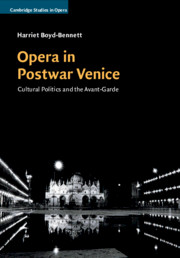Book contents
- Opera in Postwar Venice
- Cambridge Studies in Opera
- Opera in Postwar Venice
- Copyright page
- Dedication
- Contents
- Figures
- Music Examples
- Acknowledgements
- Note on Translations
- Introduction
- 1 Stravinsky’s Timely Excavations, 1951
- 2 A Futura Memoria: Verdi’s Attila, 1951
- 3 Spectral Opera: Britten?s The Turn of the Screw, 1954
- 4 Magic and Realism in Prokofiev’s The Fiery Angel, 1955
- 5 Open Works/Staging Crisis, 1959
- 6 Noisy Echoes in Luigi Nono’s Intolleranza 1960, 1961
- Select Bibliography
- Index
1 - Stravinsky’s Timely Excavations, 1951
Published online by Cambridge University Press: 24 August 2018
- Opera in Postwar Venice
- Cambridge Studies in Opera
- Opera in Postwar Venice
- Copyright page
- Dedication
- Contents
- Figures
- Music Examples
- Acknowledgements
- Note on Translations
- Introduction
- 1 Stravinsky’s Timely Excavations, 1951
- 2 A Futura Memoria: Verdi’s Attila, 1951
- 3 Spectral Opera: Britten?s The Turn of the Screw, 1954
- 4 Magic and Realism in Prokofiev’s The Fiery Angel, 1955
- 5 Open Works/Staging Crisis, 1959
- 6 Noisy Echoes in Luigi Nono’s Intolleranza 1960, 1961
- Select Bibliography
- Index
Summary
- Type
- Chapter
- Information
- Opera in Postwar VeniceCultural Politics and the Avant-Garde, pp. 32 - 60Publisher: Cambridge University PressPrint publication year: 2018



